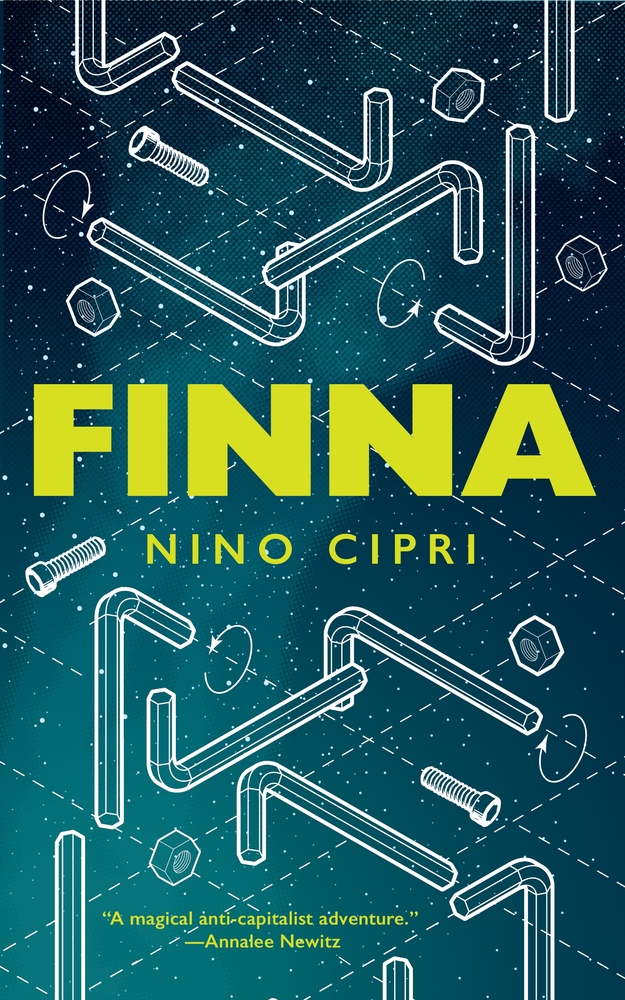In a world only a little different from our own, there exists a home furnishings store called LitenVärld. That’s “Small World” in Swedish, but it turns out that neither the store nor the world is particularly small. Both are places where people can get lost, and that’s exactly where Nino Cipri’s Finna begins: a missing grandmother, a labyrinth of affordable room solutions, and two employees who are also lost, albeit emotionally, and hoping desperately that they can help everyone get found again.

Ava and Jules discover an anomaly in one of the showrooms in LitenVärld. The rooms presumably have Swedish names, but Ava only ever refers to them by the snarky monikers she and Jules developed: “Midlife Crisis Mom,” “Nihilist Bachelor Cube” and “Newly Retired Swinger” are among my favorites. In the labyrinth of those design-by-committee nightmares there comes yet another nightmare, the sudden appearance of a wormhole. Wormholes are apparently attracted by the random and confusing layout of LitenVärld, and poor Ursula Nouri wanders into one accidentally, presumably because she’s unable to really distinguish between “Dimensional Portal” and “Parental Basement Dweller.”
The idea is more cute than anything else, and this novella didn’t lean too hard on it before getting into the real heart of the story, which is Jules’ and Ava’s (non-)relationship, which has recently—as in, three days prior—imploded. They’re still raw from all the hurt and anger, and they’re probably the worst possible duo to send on an interdimensional rescue mission.
Or maybe the best.
Because despite herself, Ava respects the heck out of Jules’ calm under pressure and their brave curiosity. And Jules definitely has to appreciate Ava’s level-headed caution and emotional endurance. There’s still a lot of good things between them, if only they can stop fighting long enough to see it. But this isn’t a gooey story about getting back together. It’s a much more nuanced story about how to still respect someone when your deeper incompatibility becomes clear, and how to find friendship in the wreckage of romance.
The novella also manages to deal with larger points about wealth inequality, gender discrimination, and mental health. LitenVärld is a toxic environment that doesn’t protect Jules’ nonbinary identification or Ava’s depression, and only wants to wring as much work out of them as possible. A lot of this is down to Tricia, the humorless wretch who helms the store. Tricia is pitch-perfect as a corporate manager, in that I despised her and the culture she enables. From the VHS tape she played in lieu of giving actual explanations of the wormhole phenomenon to the paltry offer of a single gift card to Pasta and Friends for a volunteer, she was the most awful of all the monsters Ava encountered. Her chirpy, pedantic dialogue is the perfect distillation of all the terrible bosses you’ve ever had, especially if you’ve ever worked in retail, and her obsession with toeing the line at her workers’ expense is a devastating commentary on the state of corporate America today.
In fact, every wicked thing that Ava and Jules encounter is pretty much a commentary on how corporations want to devour you whole, drain you dry, and obliterate you for brand disloyalty—figuratively, of course, but also quite literally. No matter the universe, capitalism sucks.
Fortunately, though, there are infinite universes, and infinite ways to fight back. Jules knows how to jump in with both feet, and Ava knows how to endure when the going gets tough. Their minimum-wage-assignment-turned-swashbuckling-adventure is a smart, thrilling work of hope for anyone caught in a heteronormative, capitalist grind.
Finna comes out February 25th.
